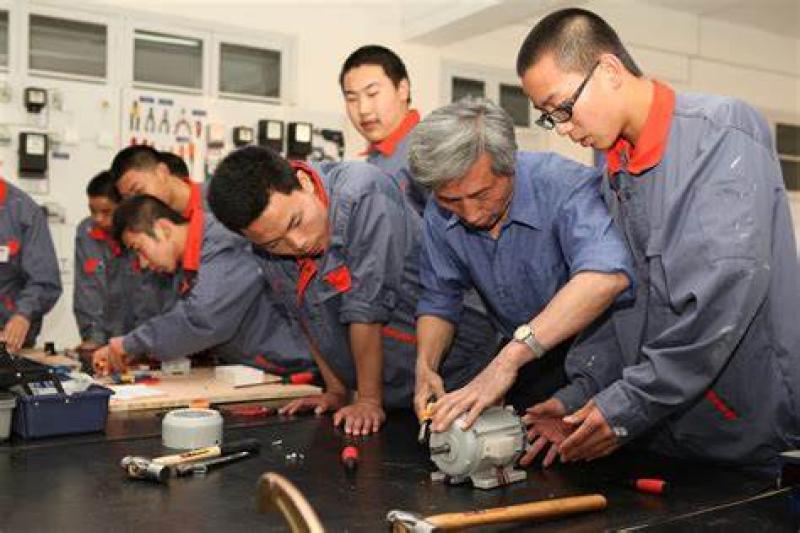Inside China's re-education centres: Trainees express contentment
By: Maher Maklad , Friday 1 Mar 2019


BUZZ NOTE: I posted this article on the Confucius group because the Front Page China bashers will not take into consideration that there could be another side of the story that does not smear China. I am only posting this because I learned in Law School that there is ALWAYS another side to a story, and if we did not learn what it was we may as well quit Law School. So there is the Trump-Pompeo agenda, and there is this one. You choose what you wish to believe. What I do know is that for more than three years the only terrorist-type attack that has been reported (and contrary to what the China-bashers would believe it was not censored) a mentally deranged old man broke into a primary school and stabbed a number of children.

Inside China's re-education centres: Trainees express contentment
For the first time, the Chinese authorities have allowed some media representatives to enter the re-education centres set up in the Xinjiang region for some Uyghur Muslims.
This follows reports in the Western media and criticism from human rights organisations which described them as internment camps.
Ahram Online was among the media delegation that visited the camps in Xinjiang and speak to several of the residents.
Claims of oppression are ‘incorrect’
The Western organisations described these centres as internment camps for Muslims. This view is rejected by China which views this criticism as in line with the calls that encourage the region’s cession.
Chinese authorities have said that they won’t allow Western media to enter these centres and accused them of having preconceived ideas and not wanting to see the truth.
Xinjiang, which is an autonomous region, is the home of the Uyghur Muslims and lies in north-western China.
Xinjiang borders Mongolia, Russia, Kazakhstan, Kyrgyzstan, Tajikistan, Afghanistan, Pakistan and India.
Xinjiang’s total area is 1.6 million square kilometres and it has a population of 20 million people, the majority of whom are Uyghur Muslims, followed by the Han then the Kazakhs, the Hui and the Kyrgyz.
It suffered from a number of terrorist attacks between 2009 and 2017.
In order to confront the terrorist attacks, the Chinese authorities imprisoned anyone who was been implicated in terrorist activities and decided to re-educate those who sympathised, and set up 12 re-education centres for them in the region.
These centres have a special educational system.
One of the conditions that permit the trainee to finish his education is that he must learn 3,000 Chinese characters so as to be fluent in this language.
Our trip began with meeting Jiang Jianguo, deputy director of the Publicity Department of the Communist Party of China, who said that China had faced the issue of achieving co-existence between different ethnicities and religions for many years.
The Communist Party has applied a national policy which was right and successful in this respect, asserting that China is the most secure and stable country in the world where 56 nationalities live in harmony.
Another official, Lu Guangjin, secretary general of China Society for Human Rights Studies in the Communist Party, explained that the Chinese government approached the terrorism and extremism problem through two steps.
The first step was issuing imprisonment verdicts against those who had committed terrorist crimes.
The second step was exerting efforts with others in order to save them from extremist ideas via re-educating and rehabilitating them and then making them return to their ordinary life.
This was done within the re-educating and vocational centres, where they are taught the Chinese language and the Chinese constitution so as to be good and law-abiding citizens. They also learn vocational skills.
The proof of these centres’ effectiveness is that there hasn’t been a single terrorist attacks in Xinjiang for 26 months.
Our next stop was Kashgar in Xinjiang. It was founded in 1952 and its population is more than 4.5 million.
Islam is the most prominent religion in Kashgar and it has newspapers in both the Chinese and Uyghur languages and 8 TV channels serving the local nationalities, including the Uyghur.
The media delegation visited one of the re-education centres in Shula. The ages of the trainees range between 18 and 45 years old. They receive six lectures on a daily basis.
The trainees can visit their relatives once a week and those who finish their re-education programme successfully are nominated to work in companies and factories.
The tour began inside the centre with a Chinese language class. One official said that after finishing the language courses they can watch films on TV and read newspapers.
In the class on the Chinese constitution and law, the trainees get to know different laws on combating terrorism and other materials.
Lectures are also given on local arts such as dancing and playing different musical instruments.
There is also a computer class where trainees are taught e-commerce skills via the internet.
The delegation members listened to several trainees’ opinions which reflected their contentment at being in these centres, how much they benefitted from them, and their appreciation towards the Chinese government for providing them the opportunity to be trained there.
In addition, they rejected claims that they had received any harsh treatment in the centres, where they are allowed to practise sports. Moreover, they advised youth to stay away from extremist ideas and lead a normal life.
In Kashgar, there is a free trade zone which lies on the Silk Road and has contributed effectively in improving employment opportunities. There is also the Id Kah Mosque, one of the largest mosques in China.
It lies in the city centre and was built in 1462. Chinese authorities allocated about 11 million yuan to restore the ancient mosque, which was included as part of China’s national heritage in 2001.
Ma Mati Toma, the Id Kah Mosque’s imam, asserted that since the 2014 terrorist attack, which his father was a victim of, the Chinese government has paid great attention to the mosque, including putting surveillance cameras inside and outside.
Our second station in Xinjiang was Hotan, which is 96 percent Uyghur Muslim. We visited a kindergarten where the Chinese and Uyghur languages are taught for free. We met a farmer who graduated from one the re-education centres in September 2018 and used to embrace extremist views.
He said that his life has changed totally after being in the centre for nine months.
One of the most important attractions is the Jama Mosque, built in 1848, where legitimate religious activities are allowed, one Chinese official stated.
The delegation paid a visit to yet another re-education centre in Hotan, where trainees are taught traditional Chinese oil painting. There is a library and a room for teaching dance.
The centre also comprises arts and cooking buildings where trainees learn to cook Chinese food and e-commerce. There is a room devoted for girls to learn to be house maids.
In Urumqi, the capital of Xinjiang, we went to see the Terrorist Attacks Museum which documents the series of the terrorist attacks that the region has suffered.
One of these attacks, shown through video footage and images, occurred on 5 July 2009 and resulted in the death of many innocent people. It is considered the most dangerous terrorist attack since the founding of modern China regarding the number of victims and material losses.
In another section of the museum, Chinese and foreign weapons used by terrorists in executing their attacks, including pistols and rifles, were displayed.
There were also weapons hand-made by the terrorists. The guide said that the museum was built as a message to showcase that Chinese efforts in combating terrorism are part of the international efforts in this respect.
The delegation went afterwards to meet Sheikh Abdel-Raqeeb, the Islamic Institute Director in Urumqi and deputy head of the Political Advisory Conference of the Chinese People in Xinjiang.
The institute was established 32 years ago and has trained more than 2,300 imams since 2017.
Halt in terror attacks
Answering a question on whether Uyghur Muslims are maltreated in the re-education centres, Sheikh Abdel-Raqeeb asserted that terrorist groups promoted extremist ideas, sowing discord between nationalities and encouraging the believers to commit violent acts against the government and the people.
Those groups called for jihad, claimed that the houses built by the government are uninhabitable, prohibited all government certificates such as ID cards and marriage certificates, and prohibited singing and dancing, describing them as satanic activities.
They say the aim of these activities is to make the believers not subject to the government’s authority. They also wanted to drag the Uyghur nationality down a wrong path through the idea of the cession of Xinjiang from China.
The institute’s director said that in the light of this situation, the government decided to establish re-education and vocational centres in order to realign those influenced with the extremist ideas to the normal path and eliminate those ideas from their minds.
Not a single terrorist attack had occurred in Xinjiang in the last 26 months, he said.
Sheikh Abdel-Raqeeb rejected Western news reports that said there is compulsory marriage between different nationalities and also denied that there was any policy for making a certain nationality dominant over others.
He stated that the USA is the source of these claims and that it considers itself the world’s policeman and refuses to believe the huge economic development China has achieved and that all the nationalities are living in unity and peaceful co-existence.
He added that all these accusations are trivial, incorrect and biased.

